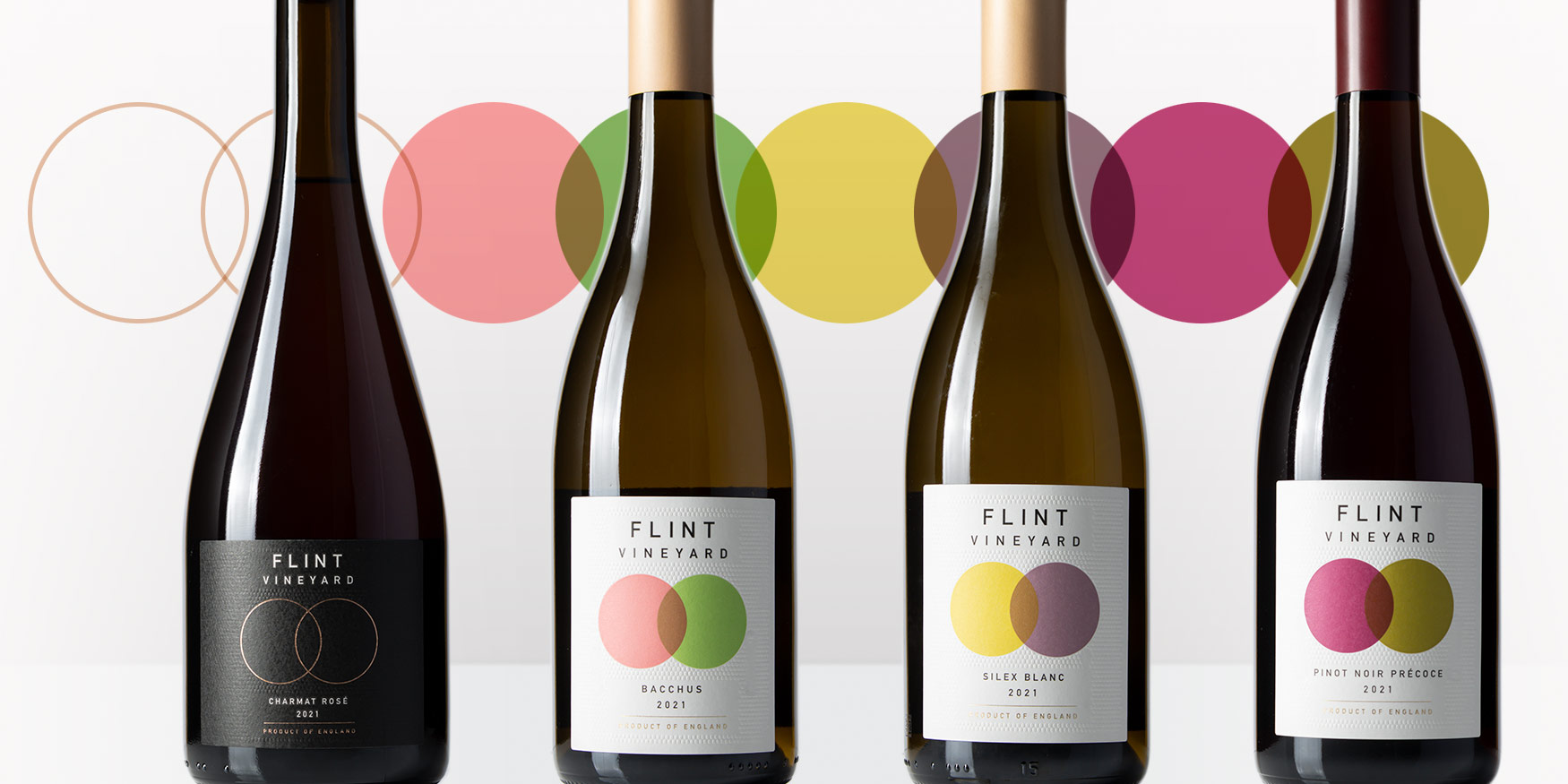
Last week I caught up with Ben Witchell, winemaker at Flint Vineyard in Norfolk, for a thorough taste of his 2021 vintage wines. Flint arrived on the English Wine scene in 2017 with their maiden Bacchus 2016 release, immediately making a name for themselves as one of the stand-out exponents of English Bacchus. Along the way, Flint’s focus on producing top quality still wine has seen additions, including the textural Silex Blanc, a vibrant Pinot Noir Précoce, as well as one of England’s first Charmat method sparkling wines. The four wines I tasted (full reviews below) were these same four wines, all coming from 2021 – often labelled as a challenging vintage – but not for Ben!
Ben explained to me that it was very cold in April 2021 in Norfolk, so much so that budburst was delayed, and, as a result, they completely escaped the frost damage that plagued many regions. Norfolk is very dry compared to much of England, and despite the heavier rainfall in 2021, it would classify as ‘normal’ compared to other regions. With approximately 60% of the fruit for 2021 coming from Flint’s vineyards in Norfolk, and the remainder from contract supply in Essex, Ben said his own fruit was immaculate and pristine. The season was comparatively cold, but was saved by a late Indian summer in September which saw the vines catch up under some much-needed sun.
All four of the wines I tasted were bright, expressive and well-structured. I would go so far as to say that the slightly cooler years in Norfolk and Essex work particularly in favour of some of Ben’s wines, mostly notably the Bacchus and Charmat. I tend to favour the more citrus, greener fruit notes than the fully ripe tropical fruit or summer berries the ’18 and ’20 vintages of these respective wines expressed.
Flint Charmat Rosé 2021
Grapes: Pinot Noir, Rondo, Solaris, Reichensteiner, Bacchus & Cabernet Cortis
The 2021 Charmat Rosé is a blend of both aromatic white and red grape varieties – Pinot Noir (25 %), Rondo (20 %), Solaris (15 %), Reichensteiner (15 %), Bacchus (15 %) and Cabernet Cortis (10 %).
This is a head-turner of a rosé, with its bright red and almost cherryade-like hue. The nose is an inviting mixture of raspberry, red cherry, pink grapefruit and lemon sherbet.
Whilst the red fruit shouts out on the nose and the colour, the palate feels much more influenced by the aromatic white grapes. There’s loads of citrus and zesty character, with grassy tones to counter the ripe cherry, raspberry and cranberry flavours.
This is a drier, slightly leaner and fresher expression than previous vintages, and I think it’s better for it.
Flint Bacchus 2021
Grapes: Bacchus
Described by Ben as a stand-out year for Flint Bacchus, the 2021 is made predominately from three parcels of Flint Bacchus and a little fruit from Essex. In addition, 10% of the wine was fermented in neutral oak, and four different yeast strains were used to bring balance and texture.
The nose on this Bacchus is immediately aromatic: lavender, elderflower and lime zest, with grass and minty tones.
To taste, it’s a big burst of zesty lime and grapefruit, which leads to a fusion of tangy tropical fruit and a lingering grassy, herbaceous finish with lime zest.
The length is really quite something, and one of Ben’s triumphs this vintage is how he has elevated the Bacchus to a structured, textural level. This feels more in line with the very first Flint Bacchus 2016, after a couple of riper, more tropical vintages in 2018 and 2020.
Flint Silex Blanc 2021
Grapes: Chardonnay & Pinot Gris
“Always a bit of a moving beast” according to Ben, Silex Blanc started off as a Pinot-based wine in 2017, with Gris, Noir and Blanc. Aromatic varieties Bacchus and Solaris have also played their part in subsequent vintages. However, the 2021 Silex is stripped back to 60% Chardonnay and 40% Pinot Blanc with a view to further differentiate the Bacchus and the Silex stylistically.
The Chardonnay was sourced from Essex’s Martin’s Lane Vineyard, whilst the Pinot Blanc is Ben’s own. The wine was made with 40% malo, 100% ferment in oak, and 100% whole bunch-pressed. 10% of the Chardonnay was fermented on skins with indigenous yeast for an orange wine-like effect.
With a nose of peach skin, orchard fruit, grilled lime and pineapple and a pinch of spiced orange, the Silex is once again hugely alluring, as is the lightly golden hue.
On the palate this is one of those wines that rewards patience. Given some air, and served just a few degrees below room temperature, Silex blossoms into a gentle giant. The promised peachiness and orange blossom welcomes like a warming hug, with the Chardonnay delivering a real stone fruit generosity. But it’s the tempered acidity and zesty lemon linearity that keeps this wine balanced and focussed, whilst a spiced ginger kick at the end keeps you salivating for another sip.
Flint Pinot Noir Précoce 2021
Grapes: Pinot Noir Précoce
Perhaps the wine in the range that will challenge most preconceptions is the Pinot Précoce 2021. Its incredibly pale complexion is not indicative of the wine’s sweet and supple depths.
The 2021 is 100% Précoce, without the Dunkelfelder which brought additional colour to previous vintages. Ben wanted to bring out the very best of the Précoce in this wine, with a 7-8 day gentle ferment on skins and then straight into ex-Pouilly Fuissé barrels for five months. This vintage has a much higher percentage of whole bunch-pressed grapes (40%) which brings a real intensity, particularly from the later pressing, with high sugar and concentration. Ben feels it shares a lot of characteristics with a really good Beaujolais.
The nose is indeed very Beaujolais-like, with ripe strawberry and cherry, hints of vanilla, cocoa, and with green hints and savoury undertones.
To taste, it’s the immediacy of the vibrant ripe red fruit, then the soft ripeness of cherry and strawberry (Précoce tends to have lower acidity than traditional Noir) that impresses. Finally, lingering earthy, savoury black truffle complexities bring a delightful balance to this little marvel of a wine.


